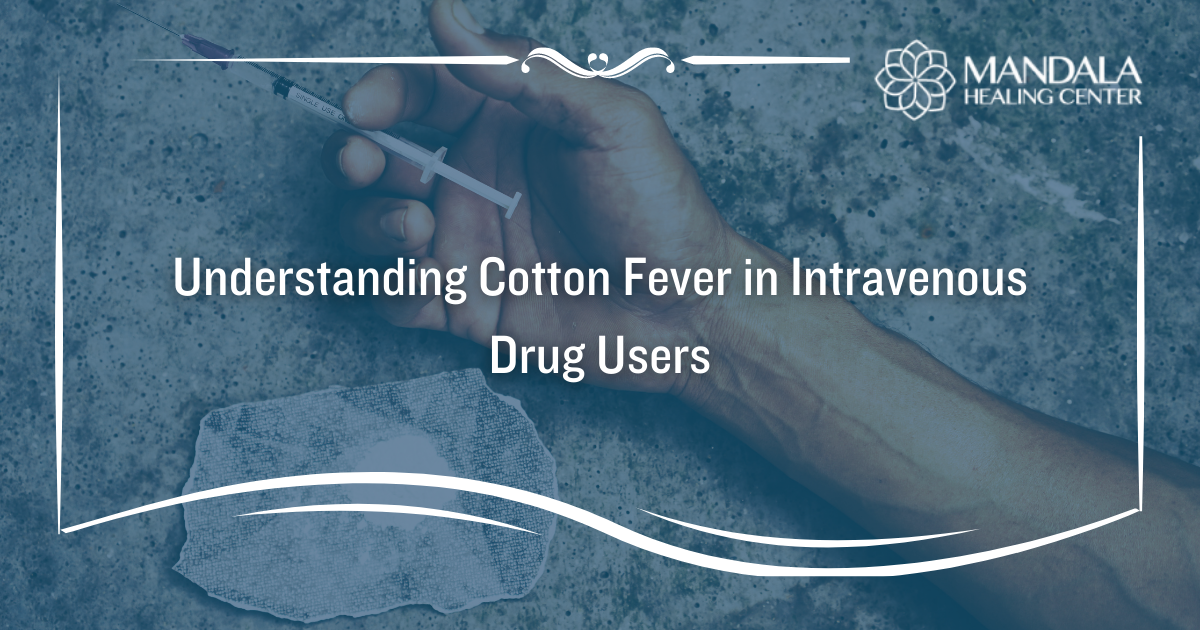According to the Infectious Diseases Society of America, about 3,694,500 people in the United States have engaged in intravenous drug abuse.[1]
Intravenous (IV) drug use involves injecting addictive substances directly into the vein. Some of the most common IV drugs include fentanyl or heroin, methamphetamine, crack cocaine, and benzodiazepines. Injection is the most dangerous way to abuse drugs, often putting people at an increased risk of overdosing and contracting infectious diseases.
Unfortunately, there are many health risks associated with IV drug abuse. One adverse effect of injecting drugs to consider is something referred to as “cotton fever.” If you or a loved one frequently engage in intravenous drug abuse, it is important to be aware of what cotton fever is and how it can affect you.
What is Cotton Fever?
When you are shooting up drugs, a filter makes it easier to draw liquid into the syringe while avoiding large particulate matter. It is extremely common for people to use cotton as a filter, such as from cotton balls or Q-tips, to prepare a needle and syringe for injection.
Cotton fever occurs when bacteria from reused cotton filters or needles are injected into your body, causing you to get seriously ill almost immediately after injecting drugs.
It is important to note that cotton fever cannot be passed from person to person. The infection only develops from using dirty cotton filters or needles. While it is generally not dangerous, leaving it untreated can lead to life-threatening health issues like endocarditis.[2]
What Causes Cotton Fever?
Cotton fever develops when you use a cotton filter to inject drugs that contain bacteria. However, the exact mechanism behind the cause of cotton fever is not completely known.
There are several theories surrounding the causes of cotton fever, including:
- Immune Responses – Your immune system is there to protect you from foreign bodies and prevent anything harmful from infiltrating your bloodstream. If bacteria gets into your bloodstream, your immune system might begin to fight it, causing you to develop a fever.
- Chemical Reactions – Some people believe that the cotton particles react differently depending on the type of substance you are abusing, triggering symptoms like fever.
- Bacteria – Certain types of bacteria can survive on cotton. When you inject your drugs into your bloodstream, some of the cotton particles might enter as well. If there are bacteria on the cotton, you could experience an immune response that includes symptoms like a fever.
Symptoms of Cotton Fever
Fever is the main symptom of cotton fever, however, it is possible to experience other effects. While some people only develop a fever, others deal with a myriad of other symptoms.
The symptoms of cotton fever might include:[3]
- A high fever
- Abdominal pain
- Aches and cramps
- Severe headaches
- Shakes and chills
- Intermittent and recurrent chest pain
- Elevated heart rate
- Increased respiratory rate
- Alterations in other vital signs
If you or a loved one abuse IV drugs and suddenly feel like you are coming down with the flu, you could be suffering from cotton fever. Because this is usually caused by a bacterial infection, seeking medical care is of the utmost importance. Leaving your symptoms untreated could lead to a variety of additional health concerns.
Can Cotton Fever Be Treated?
With proper treatment and monitoring, cotton fever tends to resolve rather easily. With that being said, most cases are treated by targeting specific symptoms to make a patient more comfortable while monitoring vital signs to ensure safety. Because the condition is caused by IV drug use, you might begin treatment for withdrawal at the same time.
Cotton fever is not always caused by an infection so antibiotics are not always necessary. However, this condition can stem from bacterial infections, which makes it important to consult with a doctor who can determine whether antibiotics are necessary.
In addition to determining whether antibiotics are necessary, treatment may include:
- Medications for withdrawal symptoms
- Anti-inflammatory medications to keep your fever under control
- Over-the-counter medications to treat body aches, pain, or headaches
- Water and electrolyte treatment to ensure that your body is receiving the hydration it needs to recover
While cotton fever is typically an immune response, it can be caused by a bacterial infection. As a result, you must seek medical attention to ensure that you are not suffering from an infection in your blood, as this can result in life-threatening symptoms.
Finding Help for IV Drug Abuse
If you or a loved one have experienced cotton fever, you are suffering from an addiction to IV drugs. Overcoming IV drug addiction can be incredibly difficult without the proper techniques and support. Thankfully, treatment programs like Mandala Healing Center can provide you with everything you need to achieve long-term sobriety.
To learn more about our drug rehab programs in South Florida, contact Mandala Healing Center today.
References:












